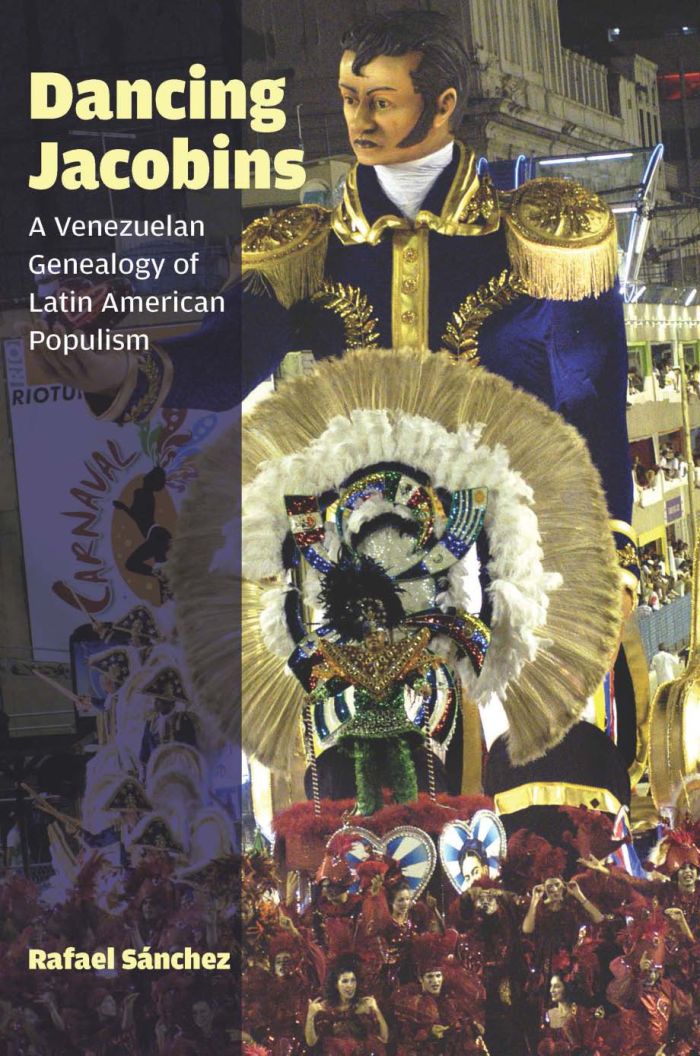Dancing Jacobins
A Venezuelan Genealogy of Latin American Populism

This book can be opened with

Since independence from Spain, a trope has remained pervasive in Latin America’s republican imaginary: that of an endless antagonism pitting civilization against barbarism as irreconcilable poles within which a nation’s life unfolds. This book apprehends that trope not just as the phantasmatic projection of postcolonial elites fearful of the popular sectors but also as a symptom of a stubborn historical predicament: the cyclical insistence with which the subaltern populations menacingly return to the nation’s public spaces in the form of crowds.
Focused on Venezuela but relevant to the rest of Latin America, and drawing on a rich theoretical literature including authors like Derrida, Foucault, Lacoue-Labarthe, Nancy, Lyotard, Laclau, Taussig, and others, Dancing Jacobins is a genealogical investigation of the intrinsically populist “monumental governmentality” that in response to this predicament began to take shape in that nation at the time of independence. Informed by a Bolivarian political theology, the nation’s representatives, or “dancing Jacobins,” recursively draw on the repertoire of busts, portraits, and equestrian statues of national heroes scattered across Venezuela in a montage of monuments and dancing—or universal and particular. They monumentalize themselves on the stage of the polity as a ponderously statuesque yet occasionally riotous reflection of the nation’s general will.
To this day, the nervous oscillation between crowds and peoplehood intrinsic to this form of government has inflected the republic’s institutions and constructs, from the sovereign “people” to the nation’s heroic imaginary, its constitutional texts, representative figures, parliamentary structures, and, not least, its army. Through this movement of collection and dispersion, these institutions are at all times haunted and imbued from within by the crowds they otherwise set out to mold, enframe, and address.
I found this book spellbinding. It has a wildly original thesis (of ‘monumentalization’) to expound. It is staggeringly erudite in terms of Venezuelan history. And it has a marvelously relaxed writing style—ironic, easy, witty, and rounded. Like a mature wine composed of various blends, it brings wonderfully well-wrought ideas to the reader’s attention, and while it seems to bear the gravitas of a life’s work assiduously distilled, it retains the sparkle of fresh discoveries. Rarely have anthropology and history, events and theory, been so beautifully entwined as here, not to mention the shocking relevance of the past to the present. I know of no publication like this.—Michael Taussig, Columbia University
Indispensable reading for any serious student of contemporary Latin American populism.—Claudio Lomnitz, Columbia University
In this fascinating and even exuberant book published by Fordham University Press, anthropologist Rafael Sánchez uncovers the complexities and contradictions of the Venezuelan nation through an impressive interplay of historiographical sources, theoretical approaches, anthropological narratives, and literary and visual artifacts.—Javier Guerrero, The Hemispheric Institute
Very few, if any, works develop a genealogy of populism in Latin America, especially from the perspective of monuments and their meaning, a topic mainly addressed by sociocultural studies seeking to make sense of phenomena that interconnect memory, power, and change. In this book Sanchez provocatively traces the role played by monuments in the rise of populism.—Hispanic American Historical Review
This book provides useful insights into the depth of populist roots in a Latin American polity... Dancing Jacobins illustrates the how political science can gain new insights for understanding political phenomena from other disciplines.—Latin American Research Review
Fortunately, there are alternatives to the Procrustean tendencies of most literature on populism, in which reality is amputated to fit theory and thinly veiled prejudices fly under the cover of method. Rafael Sánchez’s Dancing Jacobins... offer[s] an alternative approach replete with theoretical rigor, ethnographic nuance, and attention to the stubborn resilience of the masses that populism ostensibly fashions into a people.—George Ciccariello-Maher, Latin American Research Review

